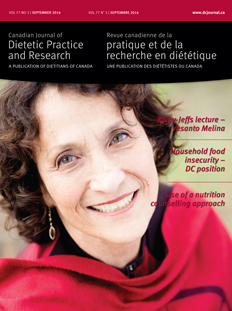Abstract
Purpose: This study describes registered dietitians’ (RDs) perceptions and use of a nutrition counselling approach (NCA) as defined by the American Academy of Nutrition and Dietetics Nutrition Care Process terminology (NCPT).
Methods: A cross-sectional online survey was administered to approximately 500 RDs in Alberta, Canada. Items included demographics, job characteristics, perceived knowledge, competence, use of an NCA, training experience, and theory of planned behaviour salient beliefs. Descriptive analyses compared RDs who counselled “all or most” of their clients with those who counselled “some or none.” Salient beliefs were analyzed using content analysis.
Results: Of the 349 RDs who completed the survey, 64.2% provided an NCA to “all or most” of their patients. RDs were supportive of using an NCA (mean = 8.7/10, SD = 1.9) and most RDs (84.5%) had received training on an NCA. Salient beliefs included advantages (e.g., improved behaviour change in patients) and disadvantages (e.g., inadequate time). Normative referents included colleagues (e.g., multidisciplinary team), managers, patients/clients, College of RDs of Alberta, and counsellors. The barriers and enablers were related to patients’ situations, infrastructure, and RD supports.
Conclusions: These results may enable decision makers to more effectively design and target training and implementation programs to improve RDs’ NCA.
Résumé
Objectif. Cette étude décrit l’utilisation que font les diététistes des techniques de counseling en nutrition (TCN) définies dans la terminologie du processus de soins en nutrition (TPSN) de l’Academy of Nutrition and Dietetics des États-Unis de même que leurs perceptions relativement à ces techniques.
Méthodes. Une enquête transversale en ligne a été menée auprès d’environ 500 diététistes de l’Alberta, au Canada. Les items concernaient entre autres les données démographiques, les caractéristiques de l’emploi, la perception des connaissances, les compétences, l’utilisation de TCN, la formation et les croyances fondamentales quant à la théorie du comportement planifié. Dans les analyses descriptives, les diététistes qui offraient des conseils à « tous ou presque tous » leurs clients ont été comparés à ceux qui offraient des conseils à « certains ou aucun » de leurs clients. Les croyances fondamentales ont été analysées au moyen d’une analyse de contenu.
Résultats. Sur les 349 diététistes ayant répondu au sondage, 64,2 % utilisaient des TCN auprès de « tous ou presque tous » leurs patients. Les diététistes étaient disposés à utiliser des TCN (moyenne = 8,7/10; écart-type = 1,9) et la plupart (84,5 %) avaient reçu une formation à ce sujet. Les croyances fondamentales comprenaient les avantages (p. ex., amélioration du changement de comportement chez les patients) et les désavantages (p. ex., manque de temps). Les référents normatifs incluaient les collègues (p. ex., l’équipe multidisciplinaire), les gestionnaires, les patients/clients, le College of Dietitians of Alberta et des conseillers. Les obstacles et les facteurs facilitants étaient liés aux situations des patients, à l’infrastructure et au soutien que recevaient les diététistes.
Conclusions. Ces résultats pourraient permettre aux décideurs de concevoir et de cibler plus efficacement la formation et les programmes de mise œuvre visant à améliorer les TCN employées par les diététistes.



